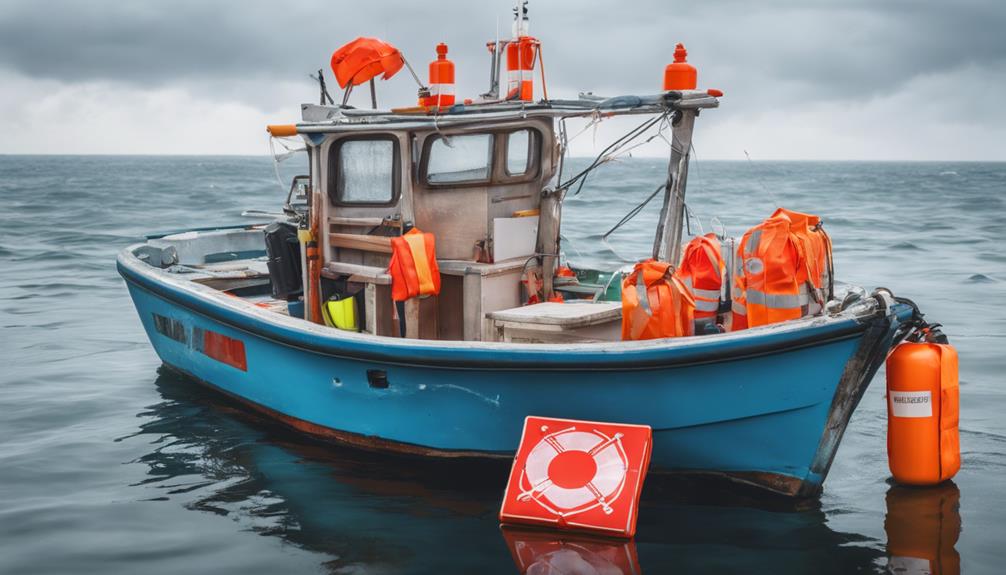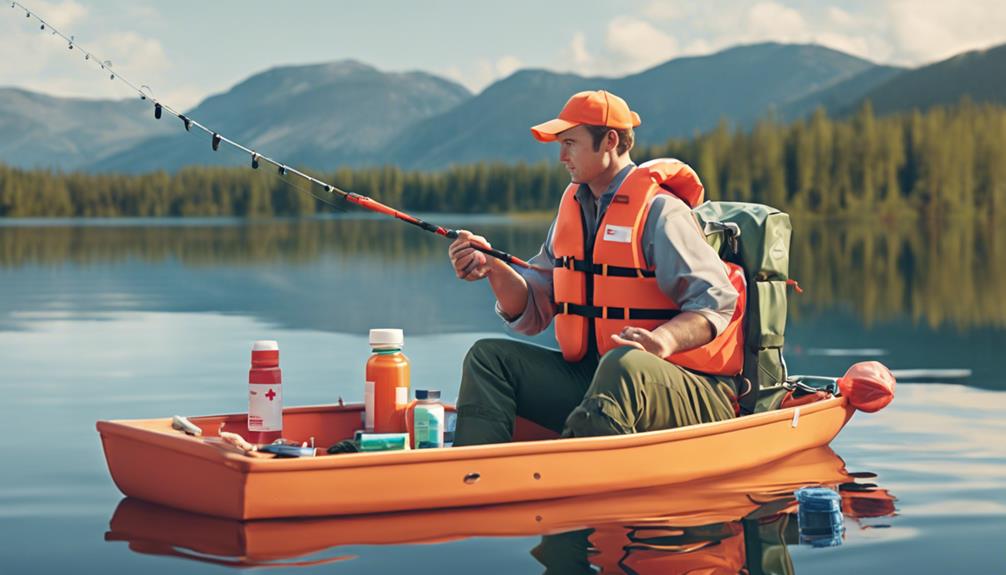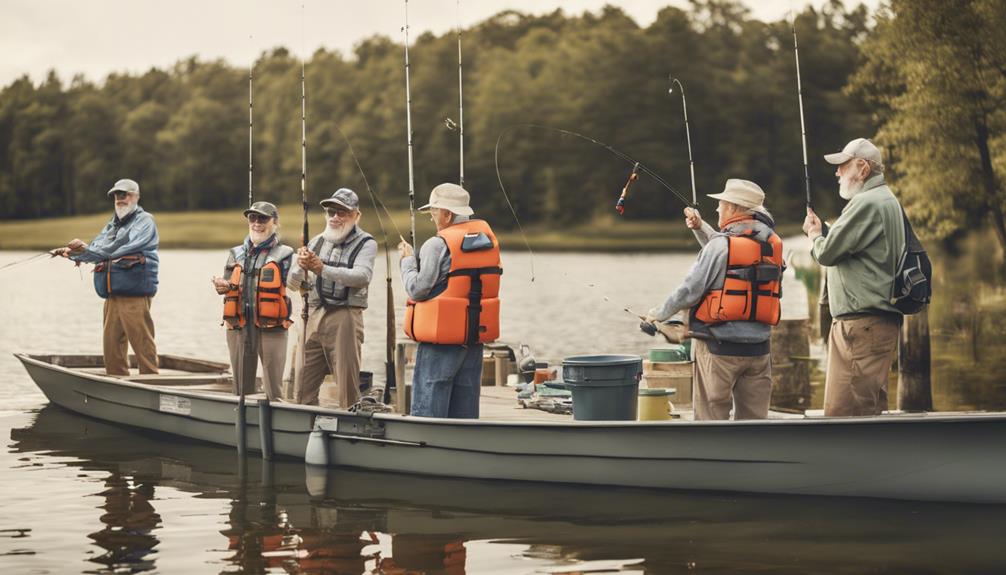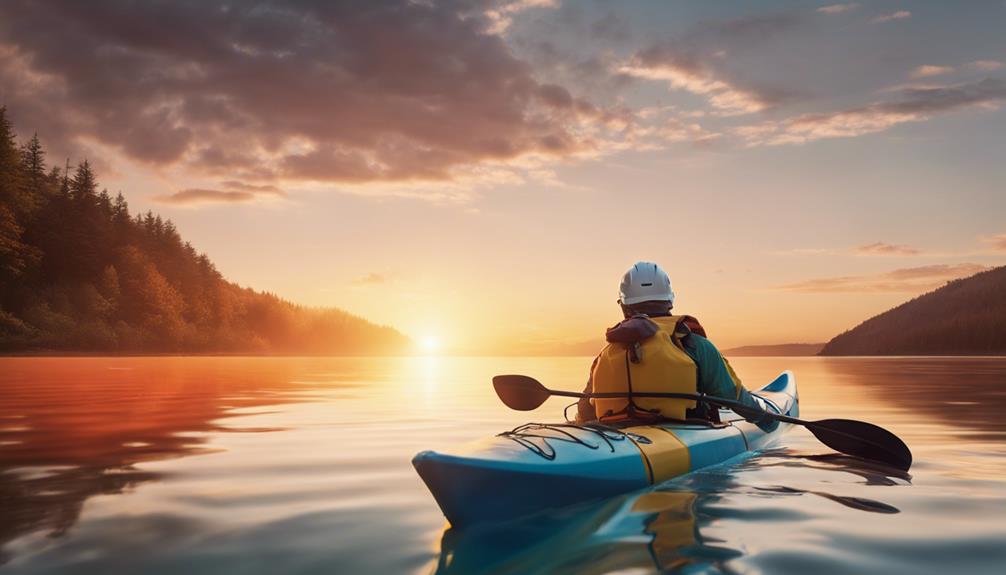Imagine you are out at sea, reeling in a massive catch when suddenly, dark clouds roll in, and the waves start to swell. Your boat begins to rock, and panic sets in.
In situations like these, having the right safety measures in place can mean the difference between a successful fishing trip and a potential disaster.
So, what are the key safety precautions you need to consider before heading offshore?
Importance of Safety Gear
When heading out for offshore fishing, ensuring you have the right safety gear is crucial for your well-being. Proper training on how to use safety equipment is essential before embarking on any fishing trip. This includes knowing how to operate life jackets, fire extinguishers, emergency flares, and first aid kits. By having the necessary knowledge and skills, you can respond effectively in case of emergencies, increasing your chances of a safe outcome.
Before setting sail, conducting a thorough risk assessment is imperative. Identify potential hazards such as rough seas, extreme weather conditions, or equipment malfunctions. By recognizing these risks, you can prepare accordingly and minimize the likelihood of accidents occurring. It's vital to have a clear plan in place in case of emergencies, such as a man overboard or a boat taking on water. Understanding how to handle various scenarios can make a significant difference in ensuring everyone's safety on board.
Weather Monitoring
Ensuring you monitor the weather conditions consistently is essential for safe offshore fishing trips. Storm tracking plays a crucial role in keeping you informed about any approaching severe weather conditions. Before heading out, always check the latest weather forecasts and keep an eye on any updates while you're out at sea. Sudden changes in weather can be dangerous, so it's important to stay vigilant.
In addition to storm tracking, monitoring sea conditions is equally important. Rough seas can make fishing challenging and increase the risk of accidents. Pay attention to sea state forecasts, which provide information on wave height, swell conditions, and wind speed. Understanding sea conditions can help you plan your fishing location and strategy more effectively.
Investing in reliable communication devices, such as a VHF radio or satellite phone, can also enhance your ability to monitor weather conditions. These tools allow you to receive up-to-date weather reports and alerts, ensuring you stay informed even in remote offshore locations.
Remember that even with advanced technology, weather can be unpredictable, so always prioritize safety. If you notice dark clouds forming or sudden changes in wind patterns, consider heading back to shore. Your well-being and the safety of your crew should always come first when venturing out into the open sea.
Vessel Maintenance
Regular maintenance of your vessel is crucial to ensure safe and efficient offshore fishing trips. Neglecting maintenance can lead to breakdowns or accidents while out at sea.
To keep your vessel in top condition, consider the following key areas:
- Engine Maintenance: Regularly servicing your boat's engine is essential for reliable performance. Check oil levels, filters, belts, and hoses to prevent any unexpected failures that could leave you stranded far from shore.
- Hull Inspection: Conduct routine inspections of your vessel's hull for any signs of damage or wear. Addressing small issues early can prevent more significant problems later on, such as leaks or structural integrity issues.
- Propeller Care and Electrical Checks: Inspect your propeller for any damage or debris that could affect its efficiency. Additionally, ensure all electrical components, such as navigation lights and communication devices, are in working order to maintain safety and compliance with regulations.
Emergency Communication Devices
To enhance your safety and communication capabilities while offshore fishing, it's essential to equip your vessel with reliable emergency communication devices. Satellite phones are a crucial tool to have on board. In remote offshore locations, regular cell phones may not have coverage, making satellite phones the best option for communication in case of emergencies. These devices utilize satellites to make calls, ensuring that you can reach out for help even when far out at sea.
In addition to satellite phones, knowing how to use distress signals is vital. Distress signals are used to indicate that you're in trouble and require assistance. Common distress signals include using signal flags, firing flares, or activating an Emergency Position Indicating Radio Beacon (EPIRB). Understanding the proper procedures for signaling distress can help expedite rescue efforts and ensure that help reaches you in a timely manner.
Knowledge of Local Regulations
Understanding the local regulations is crucial for ensuring compliance and safety during offshore fishing excursions. Not only does it help protect the marine environment, but it also ensures the safety of everyone involved. Here are some key points to consider regarding local regulations:
- Fishing Restrictions: Different areas have specific rules and regulations regarding the types of fish that can be caught, the size limits, and the allowable fishing methods. Make sure to familiarize yourself with these restrictions before heading out to sea to avoid any legal repercussions.
- Navigation Rules: Knowing the navigation rules in the area where you plan to fish is essential for avoiding collisions with other vessels and ensuring safe passage. Understanding who's the right of way, how to navigate around buoys and markers, and the speed limits in the area can help prevent accidents and keep everyone safe.
- Permit Requirements: Some locations may require permits or licenses for recreational fishing activities. Make sure to obtain any necessary permits before embarking on your fishing trip to avoid fines or penalties. Additionally, staying up to date with any changes in regulations can help you adapt your fishing practices to remain in compliance.
First Aid Kit Essentials
When preparing for offshore fishing trips, ensuring you have essential first aid kit supplies is crucial for addressing potential injuries or emergencies that may arise during your excursion. A well-prepared first aid kit is a fundamental safety measure that every angler should prioritize before heading out to sea. In addition to basic supplies like bandages, antiseptic wipes, and adhesive tape, it's important to include items specific to marine environments such as seasickness medication, sunburn relief cream, and anti-seasickness wristbands.
Having the right supplies is only part of the equation; possessing basic first aid skills is equally essential. Knowing how to clean and dress wounds, recognize the signs of heat exhaustion or dehydration, and perform CPR can make a significant difference in emergency situations. Consider taking a first aid course to enhance your first aid skills and improve your emergency response capabilities while offshore fishing.
In the event of an injury or medical emergency, quick and effective emergency response can be a lifesaver. Ensure that everyone on board knows where the first aid kit is located and how to use its contents. Designate a specific person to be in charge of first aid responsibilities, especially if you're fishing in a group. By being prepared with the right supplies, first aid skills, and a clear emergency response plan, you can enjoy your offshore fishing adventure with peace of mind knowing you're ready to handle unexpected situations.
Properly Storing Equipment
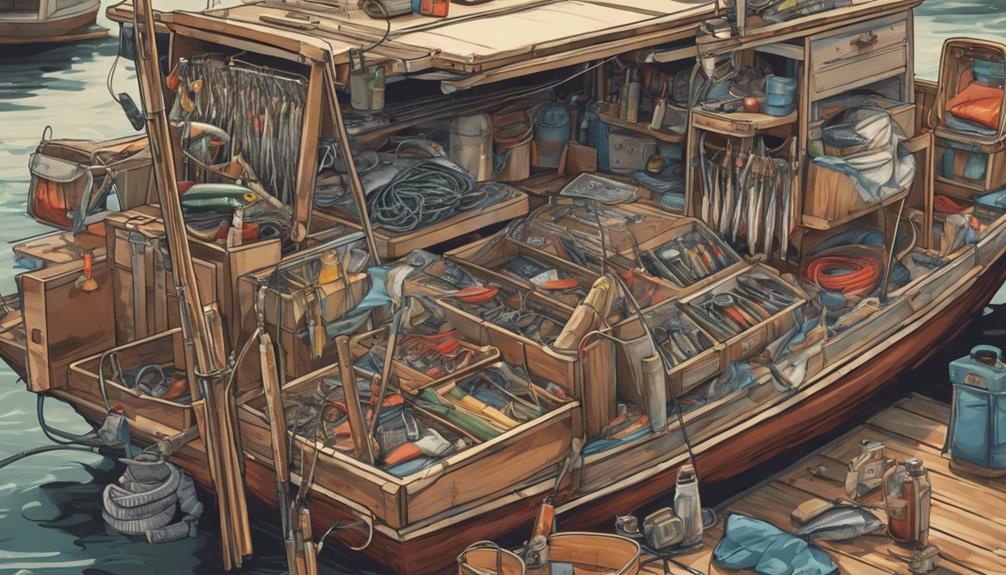
Ensure your fishing equipment is properly stored to maintain its condition and functionality for your offshore fishing trips. Proper storage practices not only prolong the lifespan of your gear but also contribute to a more organized and efficient fishing experience. Here are some essential tips for properly storing your fishing equipment:
- Tackle organization: Invest in a tackle box or bag with multiple compartments to keep your hooks, sinkers, lures, and lines neatly organized. This won't only save you time searching for the right tackle but also prevent damage from items knocking against each other during transportation.
- Equipment maintenance: After each fishing trip, make sure to clean your reels, rods, and other equipment with fresh water to remove salt and debris that can cause corrosion. Check for any signs of wear and tear, such as frayed lines or rusted hooks, and replace or repair them as needed to ensure everything is in top working condition for your next outing.
- Rod holder, bait storage: Consider investing in a sturdy rod holder to keep your rods secure during transit and prevent them from getting tangled or damaged. When it comes to bait, store it in a separate cooler or container to avoid any contamination and ensure it stays fresh for longer periods.
Preparing for Emergency Situations
In case of emergencies while offshore fishing, prioritize safety by familiarizing yourself with essential rescue procedures. Emergency drills are crucial in preparing for unexpected situations at sea. Practice how to respond to emergencies such as man overboard, fire onboard, or severe weather conditions. By rehearsing these scenarios, you'll be better equipped to handle real-life emergencies efficiently.
Communication protocols play a vital role in ensuring a swift response during emergencies. Make sure all crew members are aware of how to communicate distress signals and key information to authorities or nearby vessels. Establish clear communication channels and designate specific crew members to handle different aspects of communication to avoid confusion in high-stress situations.
Additionally, having essential emergency equipment readily accessible can make a significant difference in critical moments. Ensure that life jackets, first aid kits, flares, and emergency rafts are in good condition and easily reachable. Familiarize yourself with how to use each piece of emergency equipment to maximize their effectiveness when needed.
Frequently Asked Questions
How Often Should Safety Gear Be Inspected and Replaced?
Regularly inspect and replace your safety gear to ensure it's in top shape. This is crucial for maintaining safety protocols while offshore fishing.
Don't overlook maintenance tasks like checking communication devices, reviewing emergency procedures, and staying updated on weather precautions and fishing regulations.
Are There Any Specific Weather Patterns or Conditions That Offshore Fishermen Should Be Particularly Cautious Of?
When heading offshore, always keep an eye out for changing weather patterns that could lead to storms. Storm preparation is crucial to staying safe.
Be cautious of navigation hazards like reefs or shallow areas. In case of emergencies, have a solid emergency response plan in place.
Also, watch out for marine wildlife like sharks or jellyfish. Stay alert and prepared to ensure a safe offshore fishing experience.
What Are Some Common Maintenance Tasks That Should Be Performed on a Fishing Vessel?
To keep your fishing vessel shipshape, make sure you stay on top of hull maintenance and perform regular engine checks. Store your gear properly and maintain your electronics for smooth sailing. These tasks are essential for a safe and successful offshore fishing trip.
What Communication Devices Are Recommended for Offshore Fishing and How Should They Be Used in Case of an Emergency?
When fishing offshore, it's crucial to have reliable communication devices like satellite phones and EPIRBs. In case of an emergency, knowing how to use these tools is vital.
Make sure to familiarize yourself with emergency procedures and distress signals. Stay prepared and stay safe out on the water.
Are There Any Specific Regulations or Restrictions That Fishermen Need to Be Aware of When Fishing Offshore in Certain Areas?
When offshore fishing, it's crucial to be aware of fishing regulations in specific areas. You should always follow navigation rules to avoid accidents and respect marine life.
Safety precautions like wearing life jackets and having emergency protocols in place are essential. Make sure to stay informed about any restrictions that may apply to your fishing location to ensure a safe and enjoyable experience on the water.
Conclusion
Make sure to prioritize safety when heading out for offshore fishing. Always have the necessary safety gear on board, monitor weather conditions closely, and maintain your vessel properly.
Don't forget to have emergency communication devices on hand and be aware of local regulations. Keep a well-stocked first aid kit and properly store your equipment.
By being prepared and taking necessary precautions, you can enjoy a safe and successful offshore fishing experience.
